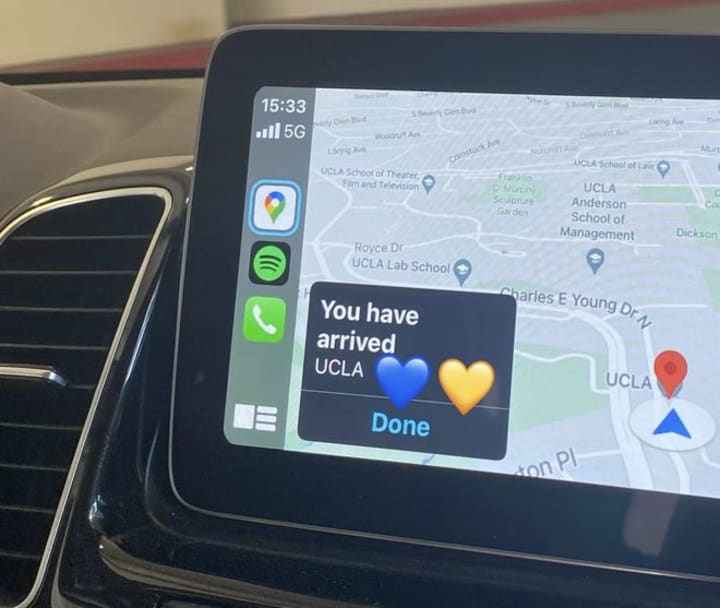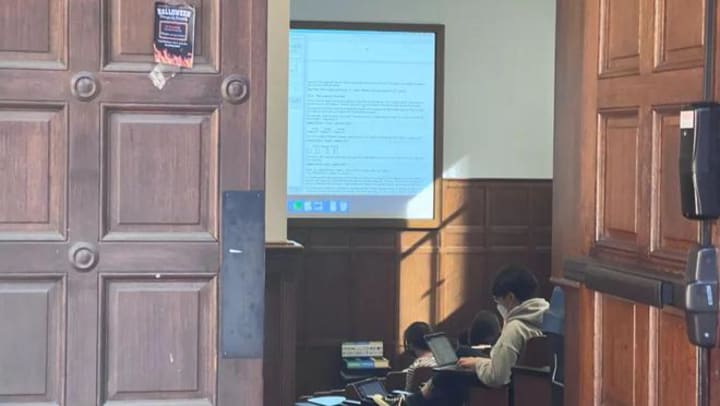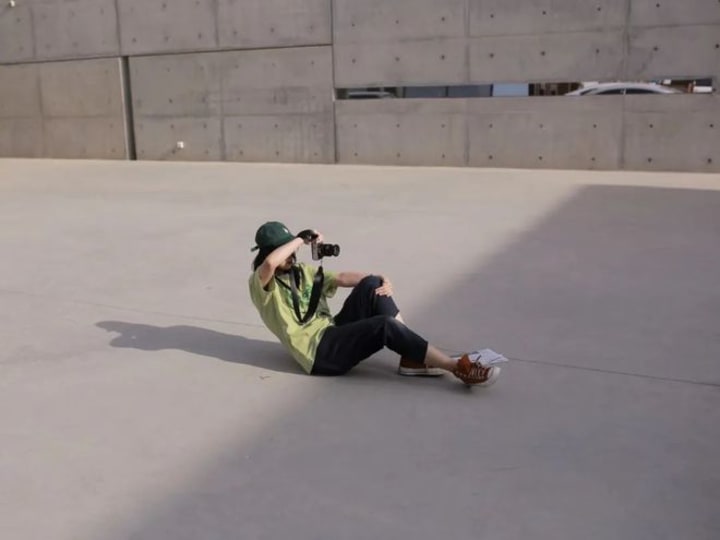She went to the United States alone at the age of 14, was angry with her host family and moved away overnight... ...8 years of study abroad, what did she gain in the end?
Chuban Shih is a junior at UCLA. In the eyes of others, she is very talented and has a glamorous and rich resume. However, at the age of 14, when she came from a strange country alone, she could feel the difficulties of being an international student, and she was "doing psychological construction every day to prevent herself from breaking down and crying at any time". She has learned to grow stronger and stronger through the challenges and pressure...

When we think of the best international students, a few labels probably come to mind: ranked among the top schools, fluent in foreign languages, high GPA, a wide range of specialties ...... Now studying at UCLA (University of California, Los Angeles), 00-year-old Shi Chufan, undoubtedly fits all these characteristics.

However, putting aside all the haloes on her body, Chu Fan told Bund Jun from another perspective about her experiences and insights in the past 8 years of her stay in the U.S. - she often heard people say, "International students must have an easy time, right?" To this question, she can only laugh bitterly and stop -
"From the time I came to the U.S. for high school at the age of 14, I would never have imagined if I hadn't experienced it myself that life abroad was not at all as smooth as I thought it would be."

PUA by host family.
Crying and running away overnight
In junior high school, Chu Fan attended a private bilingual school in Beijing. However, both parents had to stay in a different place all the time because of their work, and Chu Fan was always interested in the outside world, so she and her daughter decided to study in the United States.
The year she went abroad, Chu Fan was 14 years old, and she was only a junior high school student in China. Since the middle school system in the U.S. is exactly two years, she transferred directly to the first year of high school.
For the sake of peace of mind, Chu Fan chose to study at a well-known Catholic high school in Fort Myers, Florida, far from the big city.

The school is a day school system, Chu Fan has no other choice, through the agency arrangements, lived in a local host family, life in the United States from the official beginning. However, it was this beginning that became a lingering shadow in her mind.
The host family was a mixed family of four, the "live-in dad" was American, the "live-in mom" was Spanish, and then there were two daughters older than Chu Fan, who attended the same high school.
When she first arrived, Chu Fan was eager to get along with her host family and make it a real home. But right after she moved in she clearly felt that the two schoolmates didn't show much joy about their presence. Whenever Chu Fan talked to them, the response she got was very cold.
In the beginning, Chu Fan's life was quite normal. She went to school during the day and ate with her family at night. At the same time, she was also very understanding and would help her family with chores as much as she could.

Chu Fan's room in the host family
But the back story gets stranger and stranger.
Chu Fan's English was good, but after all, she was new to the country and needed an adjustment period in terms of learning. Sometimes she didn't quite understand the homework assigned by the teacher, so she thought of asking her host family for help. She went to the living room and asked her father to answer her questions, since her Spanish mother's English was not very good and her two sisters were just ignoring her.
But to her surprise, the next day, the resident mom actually found Chu Fan alone and started the PUA method. The general idea was to warn Chu Fan if she could not talk to Papa Sumi, which would make her daughters jealous. Although Chu Fan was a little upset, he swallowed his emotions into his stomach and acquiesced to Sumi Mom's unjustified accusations.
That night was even more outrageous. Sumi Ma refused to spare Chu Fan easily, so she got into a fight with Sumi Dad at home. When Chu Fan came back from school, he was very nervous and went over to apologize to her. She started to point her nose at Chu Fan and used all kinds of dirty and unpleasant words.
It was hard to imagine that an adult would curse a 14 year old child with such vicious language.
The complex and violent emotions of aggression, confusion, resentment and fear ...... washed over Chu Fan's tear ducts at once. She dialed her mother's phone, and immediately packed her bags and fled her residence in tears.
What's more outrageous is that this live-in mom, according to one of Chu Fan's teachers, later wrote letters to the school to denigrate Chu Fan for a year straight, simply to the point of hysteria.
Eight years later, Chu Fan is still stuck in her throat about this matter. She said that she always encountered many strange people and things on her way to study abroad. It's just that she saw it a little too early for her.
Outlander was curious if the agent's work was not done properly, which caused such a misjudgment. But Chu Fan said actually not - the agent will do some background condition screening when recommending the resident, including the actual interview with the resident, "it may be that everything is normal at the time of communication, but something not so quantifiable like character and personality is hard to find out at one time. "
The lesson Chu Fan learned from this is that it is right to believe in the goodness of other people's nature, but you must also learn to protect yourself.
If she encounters the same situation again, she will no longer subconsciously react "is not their own wrong", but to argue with reason, "I did not do wrong, why do you blame me"; at the same time, "if someone has done something move to make you feel troubled, must be the first time to communicate with the people around and help".
Otherwise, being pissed off overnight still seems too passive.

After missing the "social clock"
Don't give up on yourself
There is a concept in social psychology called the social clock, which in layman's terms means "what to do at what age". For students graduating from MHS, the social clock is to apply to the top schools as much as possible.
Given Chu Fan's performance at MHS, the odds of getting into a good school are not low. But what if life really doesn't go so smoothly according to the set clock? Chu Fan is a typical example.
Chu Fan told the Bund that because she had always been an art student, she naturally focused on the top art schools in the U.S. when applying to college.
Art colleges have a very different application model, not requiring standardized scores and placing emphasis on portfolios. Therefore, during the application period, Chu Fan spent most of her time polishing her portfolio.

Chu Fan prepares for his portfolio
After all this work was done, Chu Fan suddenly woke up at a certain point and asked herself if she really wanted to make art her career in the future. After thinking it over, she decided that she did not want to make a pure hobby a profession or even a job. Therefore, at the juncture of entering an art school, she braked down heavily.
As an onlooker, it is difficult to judge whether Chu Fan's choice was right or wrong. But for her personally, her decision at that moment was made from her heart.

Chu Fan's artwork
Of course, the choice was costly, because at that time, it was too late for her to change her strategy and apply to other schools. There was plenty of time to think about it, but the social clock never waits for anyone - should we just gap year next?
Instead of giving up, Chu Fan worked with her family to find a solution to her problem - find a community school first, and then transfer to the college of her choice through the community college.
Community schools have proven to be a good transition for students who have missed out on applications due to special circumstances, or who have lost out on applications.
Community colleges in the United States, known as Community Collge (CC), can provide students with two years of entry-level higher education. To complete a four-year undergraduate college in the U.S., one needs to pass two stages of coursework.
One is the Lower Division, which is equivalent to the basic education of freshman and sophomore year.
The second is Upper Division, which is equivalent to junior and senior year of professional courses.
After passing these two stages, you will receive a four-year undergraduate degree.
CC is, in a sense, like a devolution of the basic education of the Lower Division of a four-year university. Students can transfer to a four-year university and then take two years of specialized courses to successfully obtain a four-year undergraduate degree as well. The degree of articulation of this transfer is very high.
Typically, CC has an optimistic transfer success rate (20% to 30%). But it also depends on the specific major. For example, Chu Fan's application to UCLA's communication major is one of the lower acceptance rates, only about 9%, which means that Chu Fan had a feeling of "back-breaking" for a long time when he was studying at CC.
The results were unpredictable, and at that time, I thought, "What if I can't transfer to my ideal school? I might not even have a normal (four-year) diploma. I didn't even dare to go back to my country during those two years, just because I was afraid of any problems over here."
There were a lot of classes at CC, and Chu Fan didn't finish them until her last semester. She gave her best effort to every class and, in the end, was successfully admitted to UCLA with a perfect GPA.

"You have arrived at UCLA."
The "clock" is finally back on track.

Making friends with stress.
Growing through one lesson after another
After entering UCLA, Chu Fan was delighted but also stressed.
She clearly felt that the content of UCLA's classes "has been raised to several levels of difficulty, which is not the same level as in the past."
1. How to cope with the pressure?
This is probably a common problem for international students at top-level colleges and universities: the tremendous pressure of coursework.
For Chu Fan, liberal arts has hundreds of pages of literature to read before the start of almost every class. And because UCLA is a Quater system, the pace is relatively fast, "either on the way to catch up with the paper or staying up late in the library before the final."‘

A night at UCLA
We often say that self-discipline is important, but the reality is: at a school like UCLA, Chu Fan can clearly feel a strong "other discipline" atmosphere - there are so many good gods around that it is impossible to let up. He was pushed forward by an invisible force.
Excellent students are not only more, but also "roll". Take procrastination, Chu Fan admits she actually has a little bit of it. But she laughs, some "volume king" is too shocking, "homework teacher just set out not long, they began to ask you to finish writing, from ddl there are still two weeks, they may have been handed in on the third day ...... "

Classes at UCLA
In terms of stress coping and energy management, Chu Fan's answer is particularly honest and concise: there's no way around it - there's just a lot of homework, and "I can only say that I'll work as hard as my health allows."
When she first entered UCLA, Chu Fan was very aggressive. Once she lost an important A+ because of a careless exam, and broke down and cried in the middle of the night looking at the paper in front of the library. "It was a lot of self-blame and I didn't know how I was going to forgive myself."
However, after experiencing countless hours of picking lights to study, Chu Fan said that now she is not as tightly wound as before. The best way to learn to reconcile the stress, which can't always be on thin ice, is to learn to reconcile.
First of all, she told herself not to try to be perfect, "I realize I'm just an ordinary person, I can't do everything well, accept myself, love myself is really important," so the best state is to focus on the areas that you really want to plow, focus your energy on these things.
Chufan is interested in communication, or the study of "relationships," and much of her extracurricular practice revolves around it. In the past two years, she has also been making videos under the screen name "October Chufan" on platforms such as Xiaohongbook and B-site, so as to practice more communication skills.

Secondly, she realizes that living with stress cannot be done at the expense of physical and mental health. In her words, "I let myself off the hook, it's OK to not be the best, just do the best I can within my capabilities."
When the roll kings turn in their assignments on the 3rd day, she allows herself to turn them in on the 5th or 6th day. It's okay not to be first, don't fight with yourself.
2. the details of the explosion of lightning
At UCLA, there are two "little things" that impressed Chu Fan, and they are also a few of the thunderstorms she stepped on during the study abroad process.
The first thing is about the paper of a certain class.
When Chu Fan was doing her paper citation, she forgot to mark out one part of the paper, and when she was checking it, she was questioned by the teacher why it was so similar to a paragraph in another paper. Only then did she realize that she had missed a pair of brackets.
The teacher behind her said something that shocked her directly: "If this case of yours is not a usual assignment, but a formal paper, you will most likely be directly withdrawn from the course."
In the end, it was with the teacher's coordination that it was finally not recorded as academic misconduct. But this lesson also made Chu Fan's heart palpitate for a long time.

The second incident was an "email incident".
When Chu Fan sent an email to a teacher, she didn't specify the subject of the email, so she ran into a grumpy teacher and was accused of "Do you know how to send emails?
She later said that she never realized how important the subject of the email was until then. In school, no one teaches these details, but they are often critical.
Chu Fan said, "What you didn't learn before, society will come and teach you one day."
These two seemingly detailed experiences have fully illustrated that there are no "little things" in the American academic world, and that not being meticulous means being beaten.

Conclusion
Chu Fan was asked by The Bund if she ever regretted her decision to study in the United States and her choice of major, and she replied firmly, "No.
After years of studying and living alone in the U.S., Chu Fan said that her biggest gain is her independence.
"Taking care of myself independently, renting an apartment, buying airline tickets, applying to schools, dealing with other people head on, planning everything from life to school ......"
Independence also means having a clear understanding of your choices and being willing to take responsibility for them.
In the case of Chu Fan's communication studies, she understands that it is not a very "desirable" major compared to science and technology. But now she doesn't think about whether she will fail or escape, but "how to succeed" - is there really no place for liberal arts? Not necessarily!
Chu Fan says that although she is not a bully in the standard sense, she has the advantage of being more complex and willing to learn about different fields - just like the "gold standard" major of media. In order to broaden her horizons and professional direction, she is pursuing a minor in Entrepreneurship and plans to develop in a more cross-cutting direction in the future.
Looking back on her eight years in the United States, Chu Fan concluded, "Going abroad is a path that involves certain risks. These risks and difficulties, many times there is no way to foresee and control."
In her opinion, children must communicate well with their families and learn to protect themselves. Studying abroad is never the child's own business, but a joint decision of a whole family.
In this respect, Chu Fan is grateful to her parents because they have always maintained good communication with her and provided maximum support.
She has also seen people around her who are from very privileged families, and on the surface they look "cool, no problems", but when they have had three rounds of drinks, their emotions may suddenly explode, crying and asking "why don't mom and dad love me?" -- in fact, there are already wounds inside.
"Of course, mom and dad are also first-time parents. Many times we have to learn to tolerate each other and understand their shortcomings. Studying abroad is a family choice and requires a family to put in the effort together."

About the Creator
tige
I could have endured the darkness, yet I have seen the light






Comments
There are no comments for this story
Be the first to respond and start the conversation.